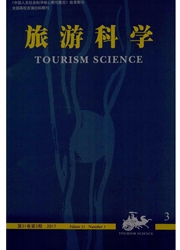

 中文摘要:
中文摘要:
本文设计了“学习及好奇”、“责任与义务”、“社会因素”、“个人情感体验”、“教育体验”5个潜变量,构建了战争纪念馆游客旅游动机对体验影响的结构关系模型,并以国家4A级旅游区南京大屠杀纪念馆为例,探讨了此类旅游动机对体验的作用机理。研究结果表明:(1)“责任与义务”是游客访问战争纪念馆的主要动机,也是与传统旅游的根本区别之一,与“个人情感体验”及“教育体验”有较高的路径系数(0.97,0.48);(2)被动地参观战争纪念馆不利于游客体验的提高,从市场营销角度看,应该强调游客积极主动的参与,强调游客“责任与义务”方面的动机;(3)游客参观南京大屠杀纪念馆几乎没有对死亡感兴趣的动机,因此战争纪念馆旅游不完全属于黑色旅游研究范畴;(4)旅游动机及体验是区分特殊兴趣旅游的主要标志,未来需从特殊兴趣旅游(如战争纪念馆旅游)角度进一步探索旅游体验的本质。
 英文摘要:
英文摘要:
This paper designed five potential variables: learning and curiosity, responsibilities and obligations, social factors, personal emotional experience, educational experience, built a structural equation model reflecting the impact of visitor motives on touring war memorials. Taking Naujing Massacre Memorial Hall as a case in point, the paper used structural equation method to estimate the parameters of the questionnaires. The results are: (1) "Responsibilities and obligations" is not only the main motive for tourists to visit the war memorial, but also one of the essential differences between tours of this sort and the traditional kinds it has a higher path coefficient with "personal emotional experience" (0.97) and " educational experience" (0.48). (2) Passively visit doesn' t help to enhance the quality of experience. From marketing perspective, it should be emphasized that a positive and active participation in touring war memorials does stimulate the "responsibilities and obligations" motives of visitors. (3) Interest-in-death motive is not found here so we conclude that war memorial tourism is not totally a part of dark tourism. (4) Since tourist motivation and experience is the key to mark special interest tourism, we suggest that future studies make further explorations into the essence of tourist experiences from special interest perspectives (such as war memorials).
 同期刊论文项目
同期刊论文项目
 同项目期刊论文
同项目期刊论文
 期刊信息
期刊信息
